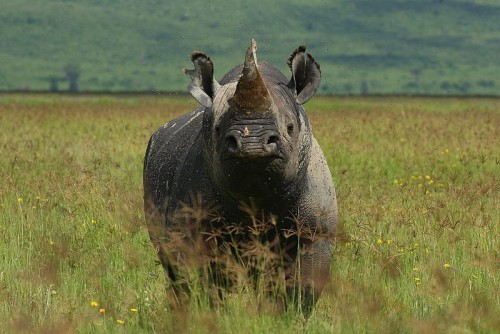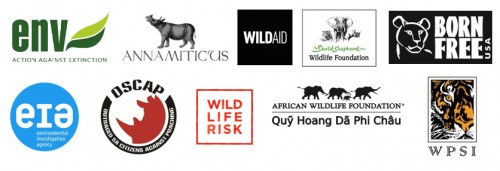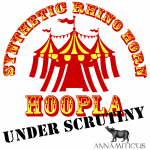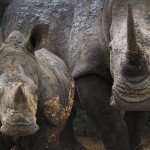
HANOI – A coalition of wildlife non-governmental organisations actively combating the illegal rhino horn trade has declared its opposition to the use of bioengineered rhino horn as a measure to curb poaching.

The coalition, which includes Education for Nature-Vietnam, Annamiticus, WildAid, David Shepherd Wildlife Foundation, Born Free Foundation, Environmental Investigation Agency, Outraged South African Citizens Against Poaching, WildlifeRisk-Hong Kong, African Wildlife Foundation and Wildlife Protection Society of India, warns that the development and distribution of a synthetic alternative to real rhino horn runs the very real risk of only exacerbating the rhino crisis by removing the stigma of rhino horn consumption and creating unnecessary obstacles for law enforcement.
At issue is an American biotech company, Pembient, established in January 2015 with the goal of replacing “the illegal wildlife trade, a $20 billion black market with sustainable commerce”. The wildlife trade coalition recommends that, under the U.S. Rhinoceros and Tiger Conservation Act of 1998, Section § 5305a (a), Pembient cease all activities related to promotion, advertisement, development, production and export of its lab-grown “rhino horn” and urges the United States to suspend any rhinoceros product-related patent or trademark applications put forth by Pembient.
Pembient claims it has biofabricated a product which “include(s) genetic components of a rhino itself”. According to the company, “a short gene of rhino keratin is inserted into either yeast or bacteria” to replicate the rhino keratin which is used in its product. Pembient says it will “incorporate rhino DNA” into its manufactured horns. The company plans to create “an unlimited supply of horns at one-eighth of the current market price” and hopes to make it extremely expensive to test for differences between its product and real rhino horn.
Pembient is already attempting to capitalize on Vietnam’s demand for rhino horn with the production of a video advertisement for “essence of rhino horn” consumer goods. In China, Pembient is partnering with a Beijing brewery to produce a rhino horn beer.
The death toll of rhinos in South Africa alone has escalated from 13 rhinos in 2007 to a staggering 1,215 in 2014, and since the beginning of 2015, at least 749 rhinos have been killed in South Africa. Between 2010 and 2014 inclusive, a minimum of 107 rhinos were gunned down in India by poachers, where 13 have been killed already this year. The two countries have the largest rhino populations in Africa and Asia, with an estimated 20,000 (combined total of black and white rhinos) in South Africa and approximately 2,900 greater one-horned rhinos in India.
The killings are driven by demand for rhino horn from Vietnam and China. Rhino horn is consumed in Vietnam in a powdered form as a cure-all for everything, from hangovers to cancer. Whole horns are sought after as status symbols among Vietnam’s nouveau riche.
Besides its use in traditional Chinese medicine, researchers report that wealthy Chinese tourists are buying “newly introduced rhino horn artifacts and jewelry” in Vietnam, where they are taken to workshops to watch the process, to ensure it is the “real thing”.
Indeed, a comprehensive study undertaken by TRAFFIC revealed that 90% of the “rhino horn” for sale in Vietnam is actually water buffalo or cow horn. The widespread availability of “fakes” has not dampened demand and in fact, has served to increase the desirability of real horn from wild rhinos.
“Introducing rhino horn from alternative ‘legal’ sources into an unpredictable market could stimulate further demand, provide a loophole into which poached rhino horn can be introduced into the market, and create huge challenges for enforcement authorities, putting the world’s remaining rhinos under even more pressure,” warns Adam Roberts, CEO, Born Free Foundation and Born Free USA.
“Rhinos must be protected, and robust demand reduction programmes implemented to educate consumers not to buy rhino horn from any source,” advises Roberts.
The Director of Outraged South African Citizens Against Poaching, Allison Thomson, vehemently disapproves of Pembient’s plan. ”Given the physical and emotional exhaustion being felt by conservationists in South Africa, the idea that some American company is going to make a fortune by increasing the threat to our rhinos is too much to bear.”
“These people may think they have all the answers, but they have no idea what they’re dealing with. It’s our rhinos that will suffer as a result.”
Pembient’s goal of making its product indistinguishable from real rhino horn is sharply criticized from a law enforcement perspective, as the availability of a “legal” lookalike substitute product that is genetically indistinguishable from the real thing would provide the ideal cover and defense for rhino horn traffickers and needlessly burden already over-taxed law enforcement authorities.
“Pembient is completely out of touch with the realities of wildlife trafficking.”
“Pembient is completely out of touch with the realities of wildlife trafficking, and has not once considered how harmful its product will be to law enforcement efforts on the front lines in Africa and Asia,” says Rhishja Cota-Larson, founder of the environmental pressure group Annamiticus.
Pembient’s business plan is not welcomed by Hanoi-based Education for Nature-Vietnam (ENV).
“Pembient risks undermining all the progress already undertaken in Vietnam by giving credibility to scientifically unproven medicinal beliefs, compromising enforcement, and potentially stimulating demand, while failing to address a key issue: status-driven rhino horn users want real horn from wild rhinos,” explains Doug Hendrie, Wildlife Crime and Investigations Unit Advisor at ENV.
Hendrie adds, “Pembient is trying to capitalize on the blood of rhinos for money and their reckless behavior is as threatening as the poaching they claim to be addressing.”
For further inquiries, contact:
Doug Hendrie, Education for Nature-Vietnam, dhendrie [at] gmail.com
Rhishja Cota-Larson, Annamiticus, rhishja [at] annamiticus.com




